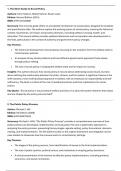1. The Short Guide to Social Policy
Authors: John Hudson, Stefan Kühner, Stuart Lowe
Edition: Second Edition (2015)
ISBN: 9781447325680
Summary: This concise guide offers an accessible introduction to social policy, designed for students
and practitioners alike. The authors explore the evolving nature of social policy, covering the historical
context, key themes, and major social policy domains, including welfare, housing, health, and
education. The second edition provides updated references and incorporates new developments in
the field, particularly in the context of austerity and government policy changes.
Key Themes:
• The historical development of social policy, focusing on the evolution from the welfare state to
contemporary policies.
• An analysis of key social problems and how different governments approach these issues
through policy-making.
• The role of social policy in shaping the welfare state and its impact on society.
Insights: The authors discuss how social policy is not just about addressing social issues, but also
about defining the relationship between the state, citizens, and the market. A significant theme is the
shift towards a more individualized approach to welfare, with an emphasis on responsibility and self-
sufficiency. The book is critical of the rise of neoliberal policies and their implications for social
justice.
Key Quote: "Social policy is not just about welfare provision; it is about the power relations that shape
and are shaped by the policy process itself."
2. The Public Policy Process
Author: Michael J. Hill
Edition: 5th Edition (2009)
ISBN: 9781405873529
Summary: Michael J. Hill’s "The Public Policy Process" provides a comprehensive overview of how
public policies are developed, implemented, and evaluated. Hill uses a systematic approach to
analyzing the policy process, presenting the key stages: agenda setting, policy formulation, decision-
making, and implementation. The 5th edition builds on the original framework and integrates recent
case studies to showcase how the process works in contemporary settings.
Key Themes:
• The stages of the policy process, from identification of issues to the final implementation.
• The role of public opinion, political actors, and institutions in shaping policy decisions.
• A critical examination of the barriers to effective policy implementation, including political,
economic, and social constraints.




